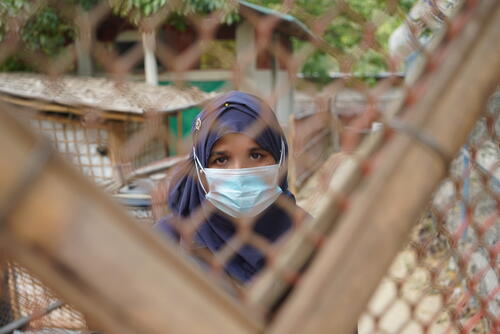Joint letter: Concerns about the health implications of the Nationality and Borders Bill
Médecins Sans Frontières / Doctors Without Borders (MSF), alongside other leading healthcare organisations, has written to the Home Secretary in the wake of last week’s tragic loss of life in the English Channel.
The letter outlines our collective opposition to the Nationality and Borders Bill due to its lasting and profound harm to the health and wellbeing of people in need of refugee protection.
Dear Secretary of State,
We write to you in the wake of last week’s tragic loss of life in the English Channel, as organisations representing medical professionals and patients, to raise concerns about the health implications of the Nationality and Borders Bill.
In its attempt to establish a two-tiered asylum system based on the way a refugee enters the UK, the Bill undermines established international protection rules and practices and breaks international law. The United Nations Refugee Agency has described these changes as “a recipe for mental and physical ill-health”.
If passed, the Bill will bring in sweeping changes to the asylum system, including establishing large-scale reception centres in the UK and offshore asylum processing sites, which will cause lasting and profound harm to the health and wellbeing of people in need of refugee protection.
Our concerns are based on a wealth of evidence from individuals held on Manus and Nauru Islands under the Australian Government’s offshore detention policy and our work supporting people in asylum accommodation across the UK.
We strongly oppose the Nationality and Borders Bill as it stands and urgently call on you to establish a kinder, fairer, and more effective approach to supporting refugees, regardless of how they arrive in the UK, including a community-based accommodation system that enables meaningful access to health services.
A group of medical organisations and health bodies wrote to you on 26 November 2020 expressing concern about the use of Ministry of Defence sites to house people seeking asylum.
The letter highlighted the sites’ unsuitability for this purpose due to the lack of access to adequate and appropriate healthcare services, public health risks resulting from a lack of compliance with COVID-19 regulations, and the risk of re-traumatisation triggered by accommodation in former military barracks.
Despite this warning, and Public Health England’s advice against using Napier Barracks because of the coronavirus pandemic, no action was taken. Residents were left managing health needs alone and reports of suicidal ideation were frequent.

Tell the government to fix its inhumane 'Borders Bill'
An inspection by the Independent Chief Inspector of Borders and Immigration found individuals “suffering from serious underlying physical and mental health conditions, including one case of active TB at Napier”, and there have been two avoidable and significant coronavirus outbreaks in the Napier site.
We are deeply concerned by plans to establish large-scale reception centres to accommodate up to 8,000 people, and that Napier Barracks is viewed by the government as a prototype for these centres.
As medical organisations, our experience of supporting vulnerable individuals in Napier Barracks and Penally Camp, as well as medical evidence from Greece which operates similarly large reception centres, show this type of large-scale accommodation prevents people from accessing medical care and presents a real risk to public health.
This type of accommodation is also inappropriate for people seeking asylum, many of whom will have experienced torture, exploitation and abuse, and are at risk of severe psychological distress and re-traumatisation.
Medical assessments conducted by Doctors of the World with residents of Napier Barracks with psychological and physical conditions found most people (77 percent) did not know if they were registered with a GP.
Evidence from MSF teams working with hundreds of adults and children contained in large reception centres on Greek islands since 2016 demonstrated acute levels of mental health suffering.
The Bill’s proposal for asylum seekers and refugees to be detained offshore indefinitely whilst their asylum claims are processed is deeply alarming from a health perspective.
Australia has implemented a policy of offshoring refugees and asylum seekers on Manus and Nauru Islands since 2012, resulting in severe and well documented harm to people’s physical and mental health whilst concealing their suffering from public scrutiny.
This must not be replicated by the UK. MSF’s mental health project on Nauru Island responded to shocking levels of mental illness among asylum seeker and refugee patients linked to the offshore processing policy.
Sixty percent of patients had suicidal thoughts and 30 percent actually attempted suicide, while 10 children and two adults were diagnosed with the rare, life-threatening condition Resignation Syndrome, which requires medical care to keep the individual alive.
The policy also perpetuated a system of violence, physical and sexual abuse of those detained and led to more than 1,200 people being medically evacuated from Nauru to Australia to receive medical care not available on the island. Many were evacuated for psychiatric reasons after years of distress on the island.
In light of these serious mental and physical health concerns, we are calling for the government to scrap the plans to establish offshore asylum processing and ensure that all asylum seekers who arrive in the UK remain in the country whilst their asylum claim is processed, by removing clause 28 from the Bill.
We also call on government to withdraw plans to introduce UK-based reception centres and make a full commitment to house people seeking asylum in the UK within our communities.
Yours sincerely,
Ellen Waters, Director of Development, Doctors of the World UK
Dr John Chisholm CBE, Medical Ethics Committee Chair, British Medical Association
Prof Maggie Rae, President, Faculty of Public Health
Sonya Sceats, Chief Executive, Freedom from Torture
Kerry Smith, CEO, Helen Bamber Foundation
Rosalind Bragg, Director, Maternity Action
Vickie Hawkins, Executive Director, Médecins Sans Frontières (MSF UK)
Emma Ginn, Director, Medical Justice
Hooi-Ling Harrison, Chair, Public Health Special Interest Group of Royal College of Emergency
Medicine
Gill Walton, CEO, Royal College of Midwives
Dr Edward Morris, President, Royal College of Obstetricians and Gynaecologists
Dr Adrian James, President, Royal College of Psychiatrists